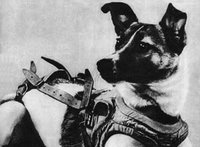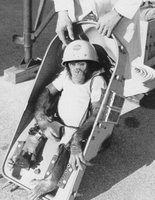 For whatever reason, I was trying to remember what had happened to Laika the other morning. You may have read about her. She was the first dog to make orbit around the earth -- on Nov. 3rd 1957 aboard the Russian Sputnik 2 space capsule.
For whatever reason, I was trying to remember what had happened to Laika the other morning. You may have read about her. She was the first dog to make orbit around the earth -- on Nov. 3rd 1957 aboard the Russian Sputnik 2 space capsule.I thought that I remembered that (in typical Soviet fashion) Laika's trip was a one-way stunt, and she died in space. Looking it up, it seems I was right, though the plan had been to put her down quietly via poisoned food. Unfortunately, the Soviets hadn't yet got space capsule construction figured out very well, and she died a few hours after launch of stress and overheating.

An American chimp named Ham had better luck in January 1961, when he flew in a Mercury space capsule and was returned safely to Earth via parachute and splash landing -- just like the later Mercury astronauts. While in orbit, he performed a number of trained tasks in response to stimuli like blinking lights and negative reinforcement from electrical shocks to his feet. (Now I think about it, negative reinforcement from electrical shocks to the feet might have been useful in reining in Mercury astronauts from our own species who ended up in Congress...)
Ham lived 22 more years after his flight and is buried at the International Space Hall of Fame in New Mexico.
However, it turns out that Ham had a number of less lucky cousins who get less press coverage. The first American monkey in space was named Albert and flew on a modified V2 rocket in 1948. He suffocated during the flight. Albert 2 (couldn't they come up with a new name if they were going to keep wasting monkeys?) survived his flight on a V2, but died on impact. Albert 3 died when his V2 blew up in flight. And Albert 4 died on impact. (It doesn't say if there was any attempt to have the V2 land differently than its military cousins in WW2.)
Yorick, another monkey, survived his flight on an Aerobee rocket along with 11 mouse crewmates in 1951, but he died two days later. Alas, poor Yorick.
In 1958 a squirrel monkey named Gordo (and nicknamed Old Reliable) successfully flew on a Jupiter rocket. Unfortunately, his vehicle was less reliable and he died as a result of parachute failure on re-entry.
All together, it seems to have been a brutish and short life being a space animal in the 50s. Still, perhaps we have them to thank for having had relatively few human deaths in the early space program.
(Repost from March 27, 2006)






2 comments:
+JMJ+
I read Laika's full story a few years ago and find it heartbreaking. Maybe I was just projecting human emotions onto her, but I do think that we could have done better by a vulnerable, trusting creature.
Seeing her death, and the deaths of other space animals, as a kind of sacrifice for humanity reminds me of the Nick Joaquin short story "Lechonito the Holy Innocent". But I hope I'm not sentimentalising them too much!
Post a Comment